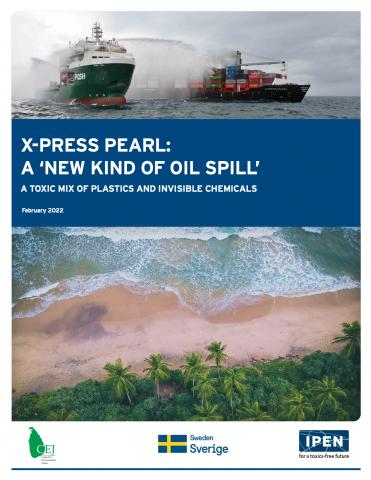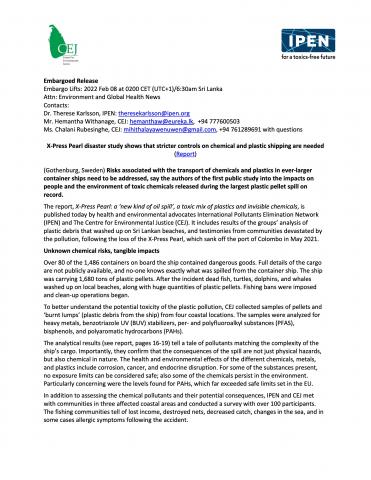Stricter controls on chemical and plastic shipping are needed

Gothenburg, Sweden Risks associated with the transport of chemicals and plastics in ever-larger container ships need to be addressed, say the authors of the first public study into the impacts on people and the environment of toxic chemicals released during the largest plastic pellet spill on record.
The report, X-Press Pearl: a ‘new kind of oil spill’, a toxic mix of plastics and invisible chemicals, is published today by health and environmental advocates International Pollutants Elimination Network (IPEN) and The Centre for Environmental Justice (CEJ). It includes results of the groups’ analysis of plastic debris that washed up on Sri Lankan beaches, and testimonies from communities devastated by the pollution, following the loss of the X-Press Pearl, which sank off the port of Colombo in May 2021.
Unknown chemical risks, tangible impacts
Over 80 of the 1,486 containers on board the ship contained dangerous goods. Full details of the cargo are not publicly available, and no-one knows exactly what was spilled from the container ship. The ship was carrying 1,680 tons of plastic pellets. After the incident dead fish, turtles, dolphins, and whales washed up on local beaches, along with huge quantities of plastic pellets. Fishing bans were imposed and clean-up operations began.
To better understand the potential toxicity of the plastic pollution, CEJ collected samples of pellets and ‘burnt lumps’ (plastic debris from the ship) from four coastal locations. The samples were analyzed for heavy metals, benzotriazole UV (BUV) stabilizers, per- and polyfluoroalkyl substances (PFAS), bisphenols, and polyaromatic hydrocarbons (PAHs).
The analytical results (see report, pages 16-19) tell a tale of pollutants matching the complexity of the ship’s cargo. Importantly, they confirm that the consequences of the spill are not just physical hazards, but also chemical in nature. The health and environmental effects of the different chemicals, metals, and plastics include corrosion, cancer, and endocrine disruption. For some of the substances present, no exposure limits can be considered safe; also some of the chemicals persist in the environment. Particularly concerning were the levels found for PAHs, which far exceeded safe limits set in the EU.
In addition to assessing the chemical pollutants and their potential consequences, IPEN and CEJ met with communities in three affected coastal areas and conducted a survey with over 100 participants. The fishing communities tell of lost income, destroyed nets, decreased catch, changes in the sea, and in some cases allergic symptoms following the accident.
“The X-Press Pearl disaster reveals the complexity of shipping chemicals. All steps should be under scrutiny to ensure this accident is not repeated. Our report shows these accidents have huge consequences on the environment and economies,” says Chalani Rubesinghe, project planning and management officer with CEJ.
Therese Karlsson, IPEN science and technical advisor, adds: “Around 90% of the world trade in goods is shipped by sea. As container ships are becoming bigger and transporting increasingly complex mixtures of chemicals, this incident must be considered the oil spill of our times. To protect coastal communities, it is therefore crucial that prevention, mitigation, and regulatory measures are adapted to tackle the risks associated with today’s shipping patterns.”
Regulations and practices need improvement
The report (page 5) gives an overview of the current laws and conventions regulating the shipment of dangerous goods at sea, the prevention of marine pollution from ships, and preparations to deal with pollution from hazardous substances.
IPEN and CEJ point out that current legislation and practices are insufficient to mitigate the risks of poorly packaged chemicals and the sheer number of different chemicals transported by container ships.
The International Maritime Organization’s Maritime Safety Commission is currently discussing how to address the loss of plastic pellets at sea and better track containers lost at sea. Currently around 1,000 containers are lost each year. Sri Lanka has submitted a proposal to classify plastic pellets as hazardous substances, and Vanuatu has presented one addressing the reporting of containers lost at sea.
”It is significant that developing island states located along the busiest maritime routes are taking a lead here. As global trade grows, their coastal communities are threatened by toxic chemicals and plastic pollution from shipping incidents that could cause them long-lasting or irreversible damage,” says Hemantha Withanage, Senior Advisor, Centre for Environmental Justice/Chairman, Friends of the Earth International.
In light of the report’s findings, IPEN and CEJ have published a list of recommendations (see Background IV Recommendations) for local communities in Sri Lanka, as well as for national and international bodies.
IPEN is a network of over 600 non-governmental organizations working in more than 120 countries to reduce and eliminate the harm to human health and the environment from toxic chemicals.
CEJ is a public interest environmental organization based in Sri Lanka established in 2004. CEJ engages in environmental awareness, litigation and advocacy, and promotes citizen science.
The report was produced with financial contributions from the Government of Sweden, the Plastic Solutions Fund, a project of Rockefeller Philanthropy Advisors, and other donors.
###

